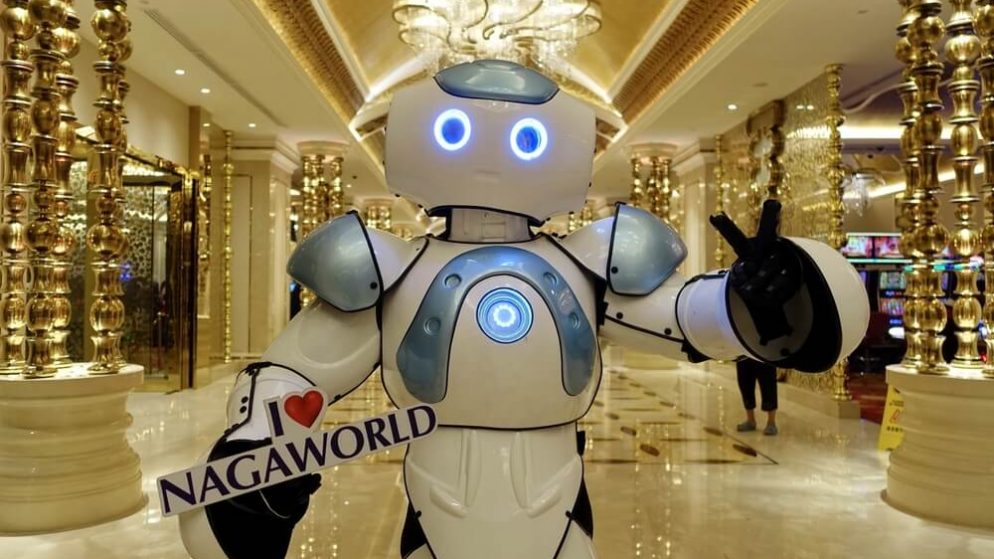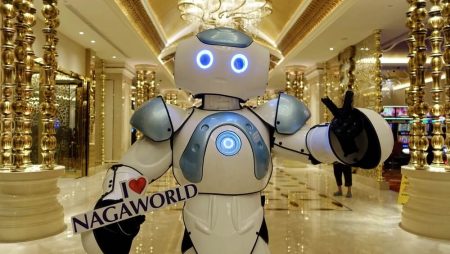

In an era where technology is rapidly transforming nearly every sector, the gambling industry is leaping into the future by deploying cutting-edge security robots. Over the last couple of years, the gambling and entertainment sector has been particularly proactive in adopting these innovations for a range of purposes including enhancing customer experiences, streamlining operations, as well as boosting security.
Amidst this technological rebirth, Penn Entertainment is proving to be a trailblazer in the country’s gambling sector. By joining forces with Knightscope, Inc., PENN Entertainment is at the forefront of adopting autonomous security robots. These robots, armed with advanced AI and real-time data-sharing capabilities, have been developed by Knightscope and represent a substantial leap in casino security technology.
Penn Entertainment will be deploying the security robots across its 43 properties, a decision which will no doubt bolster its place in the Las Vegas gambling sector. More than just futuristic novelties, these security robots signify a paradigm shift in how the hospitality industry will approach safety, efficiency, and customer satisfaction moving forward.
What we cover
The Rise of K5 ASRs: Increasing Security and Guest Experience
The robots, referred to as K5 Autonomous Security Robots or ASRs, are equipped with state-of-the-art features that elevate them to more than just machines. With a height of 4 to 5 feet, these robots are designed to traverse the casino environment autonomously, gathering fundamental security information and assisting human security personnel.
The robot weighs 398 pounds and has a maximum speed of 3 mph. The robot’s large size was intentional to deter criminal behavior. What’s so unique about these robots is that clients don’t actually pay for them. Instead, they pay for the management of the massive amounts of data the robots collect.
Their ability to move freely and share real-time data enhances the casino’s security infrastructure. These robots possess a 360-degree viewing capability, even in darkness, ensuring comprehensive surveillance. The autonomous robots are also embedded with a sensitive 16-microphone array with 2-way audio functionality, GPS, and Sonar, as well as live audio which allows live conversations between humans, kind of like a mobile public announcement system.
In essence, the K5 ASR boasts a combination of 4 technologies namely, robots, electric vehicles, autonomous self-driving, as well as artificial intelligence. The K5 ASR assists human security personnel by providing an extra pair of eyes and ears. The introduction of these ASRs marks a vital moment for Penn Entertainment as it aligns with the brand’s commitment to safety and positive guest experiences.
The introduction of these security robots could have come at a more apt time. This initiative follows closely after the high-profile security breaches that occurred recently at several established casinos. Recently, Caesars Entertainment and casinos operated by MGM were hacked by a group of teens and young adults known as Scattered Spider.
According to security researchers, the members of the group have been active over the last 2 years, targeting massively successful companies through stolen employee credentials, as well as other tricks such as duping tech support employees. The cyber attack group started by focusing on cryptocurrency thefts before heading for casino operators in Vegas.
In the wake of such sophisticated cyberattacks, the introduction of the K5 ASR (Autonomous Security Robot) at Penn Entertainment casinos, therefore, marks a major step toward strengthening security measures. These robots aren’t just deterrents; they represent a fusion of cutting-edge technologies designed to prevent and mitigate similar security breaches.
If these robots had been present during the most recent cyberattacks at Caesars and MGM-owned resorts, any suspicious behavior or unauthorized access would have been identified quickly, thus alerting human security personnel before the damage was done. In such cases, a swift response always minimizes the damage that such cyberattacks can cause.
Positive effect on security and crime reduction
Knightscope, which was established in 2013 by William Santana Li and Stacy Dean Stephens, emerged from tragic events such as the Sandy Hook school shootings and the Boston Marathon bombing. Knightscope’s mission is to make the country much safer. Since deploying its first ASRs in 2015, the firm has made considerable strides in the sector of autonomous security technology.
The ASRs have since collected more than 2 million hours of operational experience, serving clients, including law enforcement agencies. Aside from being utilized in casinos, the K5 autonomous security robots can also be found in hotels, as well as schools all over the country. Knightscope’s deployment of the robots in different settings has demonstrated their effectiveness in enhancing security.
For instance, when the robots were introduced to an apartment complex in Las Vegas that was previously notorious for frequent 911 calls, the management reported a considerable drop in the crime rate. The presence of this robot served a vital role in changing the apartment complex’s security landscape.
According to the Huntington Park Police Department, a robot deployment in the area led to a 43% reduction in crime reports, a 68% reduction in citations, as well a 10% decrease in 911 calls. These numbers underscore the major impact of these AI-driven security measures in locations such as casino floors and gambling establishments.
Penn’s introduction of these robots as part of the larger trend of reshaping the hospitality sector in Vegas is becoming commonplace. For instance, the Aura at Sphere Las Vegas, a humanoid robot has been serving as an information hub. These robots provide guests with directions and answer complex inquiries accurately.
Aura also can learn from interactions with guests, which signals the evolution of artificial intelligence in guest services and experiences. While the integration of artificial-driven technologies has the promise to maximize efficiency and guest experiences, it has also raised concerns regarding job displacement.
Final Thoughts
The deployment of security robots by Penn Entertainment represents a pioneering step into a future where human expertise and robotic efficiency coexist seamlessly. While issues relating to job displacement are on the horizon, the addition of AI technologies is inevitable. As Las Vegas embraces the robotic revolution, finding a balance between technological advancement, workforce protection, and guest satisfaction will be essential for the industry’s sustainable future.

